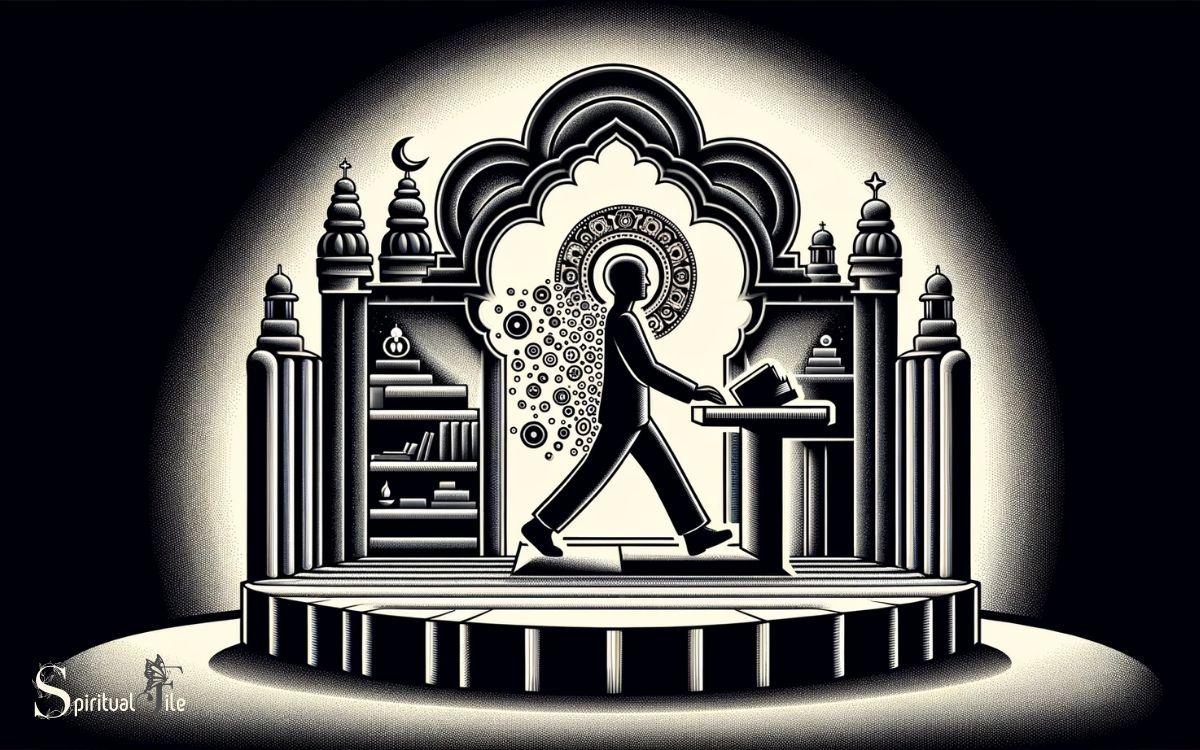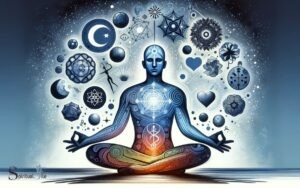Can a Person Be Religious Without Being Spiritual: Yes!
Yes, a person can be religious without being deeply spiritual. Many individuals practice religious rituals and adhere to their faith’s doctrines as part of their cultural identity or community belonging, rather than from a place of inner spiritual connection.
Being religious typically involves participation in organized practices and adherence to the beliefs of a particular faith. It’s an external expression of faith that can include attending services, praying, and following religious laws.
Spirituality, however, is more about one’s personal, inner relationship with the divine or the quest for meaning – it’s an individual and subjective experience that may or may not align with formal religion.
Here are some distinctions:
For example, a person might attend church every Sunday because it’s a family tradition, but they may not feel a deep spiritual connection to the teachings. Conversely, someone might meditate daily and feel a profound sense of spirituality without belonging to an organized religion.
While religious observance can be a gateway to spirituality, the two are not synonymous; a person can engage in the rituals of their religion without experiencing the spiritual awakening or connection often associated with deeper spirituality.

Key Takeaway
Understanding Religion and Spirituality
Understanding religion and spirituality involves exploring the interconnectedness between faith and personal beliefs. For me, it’s about delving into the core of what I believe and how that shapes my understanding of the world.
Religion often provides a framework for belief, offering rituals, texts, and a community to support and guide individuals in their faith.
On the other hand, spirituality can be more personal, focusing on an individual’s connection to something greater than themselves, whether that’s nature, the universe, or a higher power. Both religion and spirituality are deeply intertwined, yet they can also exist independently.
It’s a complex and deeply personal exploration, and the journey to understanding these concepts can lead to a greater appreciation for the diversity of human beliefs and experiences.
Differentiating Religious Practices and Spiritual Experience
Exploring the differences between religious practices and spiritual experiences has broadened my perspective on faith and personal connection.
Religious practices often involve rituals, traditions, and organized ceremonies that are integral to specific faith traditions. These practices provide a framework for individuals to express their devotion and connect with their religious community.
On the other hand, spiritual experiences are deeply personal and often involve moments of transcendence, inner peace, and connection with something greater than oneself.
While religious practices can provide a sense of structure and guidance, spiritual experiences often lead to a profound sense of inner transformation and awakening.
Understanding these distinctions has helped me appreciate the diversity of ways in which individuals seek meaning and connection in their lives, whether through organized religious activities or personal spiritual encounters.
Exploring the Role of Belief Systems
I think it’s important to consider the distinction between religious and spiritual beliefs, and how they can influence daily life. Exploring the role of belief systems can shed light on how they impact both the individual and the community.
Understanding this dynamic can provide insight into the ways in which belief systems shape our perspectives and actions.
Religious Vs. Spiritual Beliefs
My religious beliefs shape my understanding of the world and my place in it. They provide a framework for moral guidance and a sense of community.
Religious beliefs are rooted in organized practices, traditions, and doctrines that are often shared by a group of people. They provide a set of prescribed rituals, prayers, and ethical guidelines that guide adherents in their daily lives.
On the other hand, spiritual beliefs are more individualistic and are based on personal experiences, inner peace, and interconnectedness with the universe.
While religious beliefs often involve adherence to specific dogmas and institutions, spiritual beliefs tend to focus on personal growth, self-awareness, and mindfulness.
Both religious and spiritual beliefs play a significant role in shaping an individual’s worldview and ethical values, albeit through different approaches.
Influence on Daily Life
In my daily life, religious beliefs guide my actions and decisions, providing a framework for moral guidance and a sense of community. My belief system influences how I interact with others, approach challenges, and make choices.
Here’s a glimpse into how my religious beliefs impact my daily life:
| Influence | Impact | Example |
|---|---|---|
| Moral Guidance | Shapes choices | Choosing kindness |
| Community | Fosters support | Volunteering |
| Gratitude | Cultivates joy | Daily prayers |
| Compassion | Encourages empathy | Helping those in need |
| Inner Peace | Nurtures well-being | Meditation practice |
My religious beliefs not only provide a moral compass but also foster a sense of belonging and purpose, enriching my daily experiences.
Community and Individuality
Belief systems play a pivotal role in shaping the dynamics of community and individuality.
- They provide a sense of belonging and connection to a larger group, fostering a shared identity and values.
- At the same time, belief systems also allow for individual expression and variation within the community, accommodating diverse perspectives and experiences.
- They can offer support and guidance in navigating the complexities of interpersonal relationships, providing a framework for interaction and understanding.
- Additionally, belief systems can influence the way individuals perceive themselves within the community, shaping their sense of purpose and contribution.
Ultimately, belief systems serve as a bridge between the collective and the individual, creating a delicate balance between communal solidarity and personal autonomy.
Examining the Impact of Community and Tradition
Through my experiences, I have come to understand the profound impact that community and tradition can have on shaping an individual’s religious identity.
Community provides a sense of belonging and support, while tradition offers a framework for understanding and practicing religious beliefs.
Below is a table that highlights the key ways in which community and tradition influence religious identity:
| Community | Tradition |
|---|---|
| Provides support and belonging | Offers a framework for beliefs |
| Shapes beliefs and practices | Preserves cultural heritage |
| Facilitates shared rituals | Transmits values and ethics |
| Offers diverse perspectives | Creates a sense of continuity |
These elements not only shape an individual’s religious identity but also contribute to the richness and diversity within religious communities.
Challenging the Notion of Religious Vs. Spiritual Identity
Having explored the influence of community and tradition on religious identity, I find it essential to challenge the dichotomy between religious and spiritual identity.
- Reconsidering Definitions: It’s crucial to reexamine the rigid definitions of “religious” and “spiritual” to understand the interconnectedness of these identities.
- Exploring Overlapping Aspects: By exploring the overlapping aspects of religious and spiritual identities, we can discover common ground that unites individuals across different belief systems.
- Recognizing Diverse Expressions: Understanding that religious and spiritual identities are expressed diversely among individuals and cultures can help break down the perceived divide.
- Embracing Complexity: Embracing the complexity of religious and spiritual identities allows for a more nuanced understanding that goes beyond simplistic categorizations.
Challenging the notion of religious versus spiritual identity opens up avenues for deeper understanding and appreciation of the multifaceted nature of human belief systems.
Embracing Diversity in Religious and Spiritual Expression
As I reflect on the diversity in religious and spiritual expression, I find it fascinating how individuals navigate their personalized faith journeys. Embracing this diversity allows for a deeper understanding of the different ways people connect with their beliefs.
It also opens up opportunities for meaningful conversations and mutual respect, fostering a more inclusive and enriching community.
Religious Versus Spiritual
Although I am religious, I have come to appreciate the diverse expressions of spirituality among different individuals and communities.
- Respect for Differences: Embracing spirituality means acknowledging and respecting the diverse ways in which people connect with the divine or higher power.
- Finding Common Ground: While religious practices may differ, the underlying spiritual essence often unites individuals in their pursuit of meaning, purpose, and transcendence.
- Openness to Learning: Engaging with diverse spiritual expressions can broaden one’s understanding of the human experience and foster empathy and compassion.
- Celebrating Diversity: Rather than viewing religious and spiritual diversity as a source of division, embracing the richness of varied beliefs and practices can lead to mutual respect and a shared sense of interconnectedness.
Understanding and respecting the differences between religious and spiritual expressions can lead to a more inclusive and harmonious society.
Personalized Faith Journeys
In my journey of faith, I have found meaning and connection through embracing and exploring the diverse ways in which people express their religious and spiritual beliefs.
I’ve come to appreciate that each person’s path to spirituality is deeply personal and unique. This realization has allowed me to open my heart and mind to the richness of diverse religious and spiritual practices.
Embracing the varied expressions of faith has enriched my own spiritual journey, fostering a deeper understanding and acceptance of others.
I’ve learned that there is no one-size-fits-all approach to spirituality, and that diversity in religious and spiritual expression is something to be celebrated rather than feared. It’s through this embrace of diversity that I’ve found greater depth and fulfillment in my own spiritual beliefs.
Conclusion
I believe that a person can be religious without being spiritual, but it ultimately depends on how one defines and experiences these concepts.
While some may find fulfillment in religious practices, others may seek spirituality through personal connections and experiences.
At the end of the day, it’s not about fitting into a specific mold, but finding your own path and embracing the idea that “different strokes for different folks” when it comes to religious and spiritual expression.






